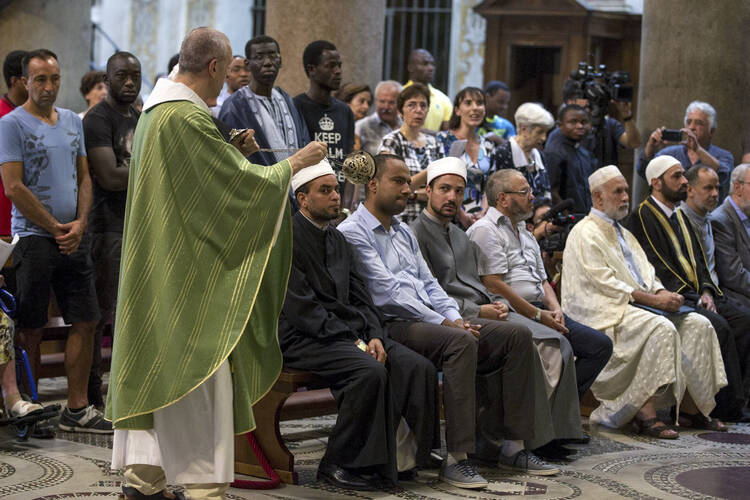What on earth is happening to us? Optimism isn’t an easy position to embrace these days. Much of our world is currently more broken, more ill-at-ease than ever before. Not only have we in Europe increasingly experienced the sorts of murderous atrocities that people elsewhere have had to live with, and die with, for years; but our public life, both in Britain and the United States, is turning ever more sour, vicious and confrontational.
Dialogue is a sign of weakness to some. The online world leads us back to our encampments, comfortably in conversation with only those of like mind, reinforcing and confirming the views that we already held. We visit the websites or, for those who still read them, subscribe only to those newspapers or magazines that mirror our own opinions and attitudes. And when attitudes become hardened they convert to prejudices, difficult or downright impossible to challenge in any creative manner, still less with generosity.
When that happens, we begin to lose the ability to see that which is not broken, that which remains generous and other-centered, yet, sadly, less newsworthy or sensational. To be a discerning person, a goal for every follower of Christ, is to see and acknowledge that so much is fractured yet resist being dragged down into the morass where we will no longer be able to discern what remains good and true, where we have lost the ability to distinguish the superficial from the relevant.
The martyrdom of Father Jacques Hamel, an elderly priest in northern France, is shocking by any decent standards. The young adults who committed the murder, slitting the throat of the 84-year-old priest as he celebrated Mass, claimed allegiance to the Islamic State. Similar claims are made in other parts of the world that have witnessed other atrocities, just as shocking. But is there an inherent link to Islam? That does not seem to square with the frequent assertions of non-radical Muslim leaders, in British cities and elsewhere, that these indoctrinated extremists do not represent the mainstream of the religion. If the link is extrinsic to Islam, by definition it comes from a source outside the faith and thus does not contain or reflect essential teaching essential.
When Christians are, quite correctly, horrified and outraged by violent attacks on our co-religionists, it remains important not to condemn a whole faith. Pope Francis just said, in an in-flight interview returning from World Youth Day in Krakow, Poland, that what we are experiencing is “not a war of religions,” as many secularists like to claim.
To avoid being drawn into just such a religious war, Christians, who feel deeply the suffering of the victims, must continue to discern the meaning and implications of these events. Up to now, war has implied two opposing sides, but neither Islam nor Christianity is attacking the other. There is great danger in any potential delusion that this is a war between the faiths.
In the days following Father Hamel’s murder, news emerged that he had been a vigorous protagonist for interfaith dialogue in Normandy. It further emerged that this humble priest and his parish had made land available for the local Muslims on which to build their mosque. That is worth repeating as often as possible.
Most of us have signed up to the view that a healthy and vigorous dialogue between the church and the culture is an absolute requirement of being a Christian today. No fuga saeculi (“flight from the world”) can be our response. The murderers of Father Jacques in France were blinded by an ideology so strong that they had lost any sense of humanity.
Pope Francis concluded World Youth Day with an impassioned entreaty for a “new humanity,” urging his huge congregation to “help bring about another humanity, without looking for acknowledgement but seeking goodness for its own sake, […] to fight peaceably for honesty and justice.” If we attain the virtues by practicing them, where should we start? Francis suggests this: “to believe in a new humanity, one that rejects hatred between peoples, one that refuses to see borders as barriers and can cherish its own traditions without being self-centered or small-minded.”
David Stewart, S.J., is America's London correspondent.








